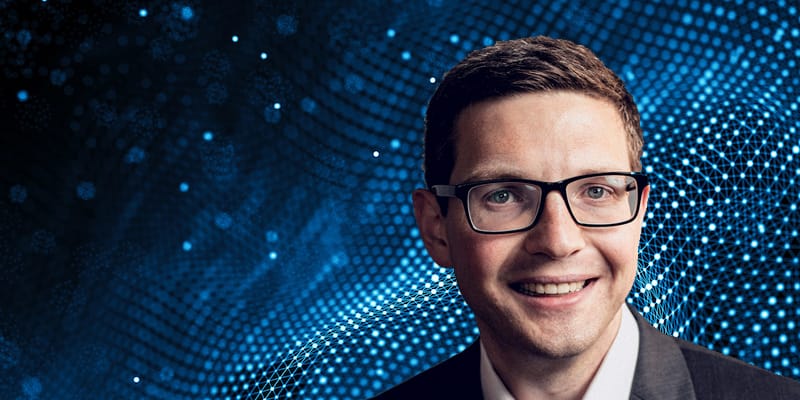Ahead of his appearance at LegalEdCon 2024 next month, LexisNexis’ Matthew Leopold discusses its latest AI offering and how it will likely impact the legal industry

“My specialism is to take a brand and challenge people’s assumptions about it,” says Matthew Leopold, Head of Brand and Insight at LexisNexis UK. “My job is to get people to feel more positive about a brand and engage with it in a different way.” Having built a specialism in brand management at tech companies, Leopold notes ironically that one of the biggest challenges of his role at LexisNexis is adapting a brand that almost every lawyer already knows. “Not only is it well known, but LexisNexis is a brand which lawyers understand and trust, and that’s because of the wealth of legal content that underpins the technology.”
Having evolved from a single database created by John Horty in 1956, LexisNexis has moved away from traditional publishing by becoming a global player in legal technology. Leopold is keen to stress the company’s tech-y credentials. “We ultimately create solutions that provide the right legal content at the right time; our technology helps people to find the diamond in the haystack of content,” says Leopold who will be speaking at LegalEdCon 2024 in London on 16 May. On the rewards of his role, he says, “it’s really interesting to be able to create cutting edge legal technology with this underlying, incredibly valuable, exceptionally well-trusted legal content.”
In response to developments in generative AI technology, LexisNexis developed and launched its own AI tool, Lexis+AI, at the end of 2023. Available in the UK in the coming weeks, Legal Cheek Careers was keen to ask Leopold for the key features of this new tech. “At launch, there are four main features that Lexis+AI is going to offer,” he tells us. “First is the conversational search feature. Imagine that you have a really knowledgeable associate sat on the desk next to you, and you can ask them a legal question and get a legal answer in response, pointing you in the direction of all the relevant information.” He continues, “the purpose of the conversational aspect of the search, means you can clarify, and ask a follow-up question to which Lexis+AI responds to your requests and refines answers.”
Explaining the benefits of this feature in terms of access to legal research, Leopold explains that, “the sorts of conversations that you would usually have with a human, you can now have with AI — and in this context, it allows you to really mine the depths of the law.” Grounded on the already expansive LexisNexis legal database, Lexis+AI can link you directly to relevant precedents, case law and practice notes within seconds. Leopold explains that this is key to reducing AI ‘hallucinations’ — circumstances where AI models produce nonsensical, falsified information. “We can minimise hallucinations as much as possible,” he says, “however linking directly to the content means that lawyers and students can quickly evaluate AI answers with their own eyes”.
The second key feature of this potentially industry-altering tech is its summarisation capabilities. Leopold notes that, “public access AI tools, such as ChatGPT are not legally trained. They don’t understand the legal use-case for what it’s doing.” The difference with Lexis+AI is that “rather than producing a summary of a case, it presents a case digest which includes jurisdiction, key material facts, controlling law and more.”
Lexis+AI also boasts drafting capabilities and the ability to upload your own documents for review. “Lexis+AI can help you draft clauses, form arguments, and create letters to clients,” Leopold explains. By integrating the features of the technology, both lawyers and students are able to extract information through conversational search. They can then prompt Lexis+AI to use this information to create legal arguments or letters. “It’s important to emphasise that this will result in a first draft,” Leopold stresses. “We do not proclaim that this is going to be the end result. You would always expect a senior to review the work of junior before it goes to a client. The same is true with AI-generated content.”
In that vein, we ask Leopold how he envisions the future of the legal industry with the introduction of generative AI, and where the boundaries between the lawyers and computers really lie. “AI is the next big frontier,” he says. “There is no avoiding it; it’s a matter of when not if. There are going to be fundamental changes to the legal market., Take the good old billable hour. It is going to change. In a world where technology can do the heavy lifting of legal research in couple of seconds, the whole idea of charging by the hour becomes difficult to justify.” He predicts that we’re likely going to see an evolution towards value-based pricing in law firms, and more innovative fee structures, as firms transform with the implementation of AI.
“Historically, the legal industry has been a slow adopter of technology,” says Leopold, “This is the first piece of technology that is truly challenging the status quo. Law firms are now considering what this means for their core business and the skills that the lawyers of tomorrow will require. There is a very exciting and busy future ahead for lawyers and the whole legal industry.”
Following the idea that AI is paving the way for some dramatic shifts in the legal industry, we’re keen to hear Leopold’s thoughts on the differences between the role of a lawyer and the role of AI in legal research. “I think that both are the future, and that one can’t really exist without the other,” he says. “We are very clear that Lexis+AI is not created to replace a lawyer. Lawyers need to still be in the loop because they can identify legal context, and other concepts which cannot be trained into an AI model.” Similar issues are raised, Leopold continues, when one considers the human aspect of legal work, requiring negotiation skills, teamwork and often empathy. Ultimately, AI’s ability to reduce manual, administrative legal tasks is huge, leaving lawyers to focus on problem solving, according to Leopold. “AI will do the heavy lifting so that the lawyer can do the heavy thinking.”
Matthew Leopold, Head of Brand and Insight at LexisNexis UK, will be speaking at LegalEdCon 2024, Legal Cheek’s annual future of legal education and training conference, which takes place in-person on Thursday 16 May at Kings Place, London. Final release tickets for the Conference can be purchased here.
About Legal Cheek Careers posts.


